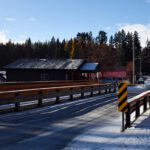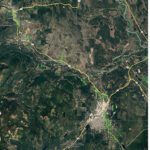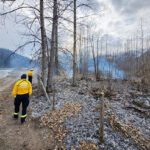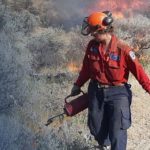Home »

The Valley will Echo no more
By Ian Cobb
I’m going to feel some sadness tomorrow (July 13).
The Valley Echo, a once venerable community newspaper respected across Canada, is closing its doors.
After about 70 years serving the valley, recording history’s passage and informing the community about need-to-know matters, she is being put to pasture after being purchased by her cousin, the Columbia Valley Pioneer.
My sadness stems from a couple of streams, the slowest flowing one being the continued demise of community newspapers around the country, and world, the inevitable result of the swing from print to digital. Newspaper empires and their great slow death anchors – printing presses – continue to fall.
The corporatization of journalism combined with the rapid transformation of society away from getting news and info through newspapers to digital formats, has been a double tap to the back of the head of quality journalism in Canada.
That has led to a terrible decline in the number of skilled people keeping close tabs on governments, business and police forces etc. Journalists, like them or not, have been society’s spear tip to the ribs of those who might seek to exploit society for his/her own means. We have been the equalizers and we have been champions for a myriad of causes – always seeking, as per our training and personal traits, to better society through truth, transparency, consistency and fairness.
However, that was an inconvenient thing to those who sought to exploit and trample and generally have their way without care of consequences to communities or the environment, hence the current atmosphere. A loss of any number of the people who perform those tasks is a grave matter that must be slowed. There are thousands of journalists out of work as I write this.
At a time when a corpo-pig and slimy buffoon like Donald Trump has taken control of the world’s most powerful nation, riling up millions of sloths from their reality television hazes and various pits of hate and inciting them to form ideas that journalists are the enemy, oversight is all the more important.
The presence of journalists, even in small towns, results in less corruption and fewer acts of complete stupidity by those who don’t care.
Let me put it to you this way; in my near two decades at The Valley Echo I published roughly 10% of all the information I gathered. What happened to the other 90%? Aside from the stuff that wasn’t worthy of publication, a great deal of that information merely dissipated into thin air after issues became ‘solved.’ It’s amazing how many stories disappear into thin air, as struggles, disputes, issues etc. become ironed out once a journalist start nosing around, asking questions.
I honestly couldn’t give you a number of the times I killed a story because one of my reporters, or myself, became involved and the ‘problem’ we looked into ended.
We also never backed down from hard stories; something that happens far too often nowadays.
And that brings me to the second and far greater stream from which stems my sadness about The Echo closing.
In 1991, then Echo publisher Keith Bennett and editor Carol Maloney gave me my first job as a journalist. I left in 2009. A lot of life was lived between those years.
The Echo, and the people who worked there, were a huge part of my life. Many of those people also arrived in the valley via employment at The Echo and remain today.
We were lucky enough to be a part of the latter half of the paper’s life.
Belle and Ron Ede and Winnifred Weir established The Echo in the early 1950s and I was blessed to have been tutored and mentored by them on occasion, as was my partner-in-crime, long-time publisher Sheila Tutty.
It has to say something that a community newspaper that was a family business for several decades remained one, in a way, after it was sold to Bob Doull, then owner of a funky little newspaper chain called Black Tusk.
Sheila was production manager and I was a reporter in 1991. I became editor in 1994 and Sheila became publisher in about 1996; she was still publisher when I left in ’09. It is not at all normal for small town newspapers, which afford little to no comfortable lifestyle via wages, to have senior staff last so long. Junior staffers tends to come and go fairly rapidly as they seek better paying jobs or flee demanding editors with Kootenay on their breath.
We ground through a lot of staff over those years, but lots of them also stuck around for many years. Right Kelly? Lynda? Cal? Kate? Brenda? Cathy? Stephanie? Steve? Pablo?
We now have quite the extended family – we former Echoites. There are so many I cannot name them all, nor could I as some last names have changed and the multiple concussions I have had in my life have disabled my memory somewhat.
But what I can say is that my love, respect and appreciation for them all is endless.
To the woman and man, they put up with me for many years. I wasn’t easy to work with, especially before the turn of the century. I softened as I aged and some of my first reporters had to deal with J Jonah Cobb (or “Invermere Ian” as Carrie says).
There are so many memories.
Developing dozens of rolls of film on a Sunday night after cranking out a week’s worth of stories before deadline. Sheila so sweetly stepping in and developing film for us when we were swamped. Teamwork was always the thing at The Echo. Even when we had issues ‘getting along’ (all families have their ‘moments’) we still produced one of the best community newspapers in Canada over a lengthy stretch of time.
Not all the memories are fond ones. When you work in a community newspaper for years on end, you make many friends in the communities you cover. So when tragedy would strike, there was always the fear of ‘will it be someone I know?’ Oftentimes it was.
I think of all the ‘safety meetings’ with my reporters, and the ‘editorial soirees’ we’d take now and then, visiting with (see also: getting bent with and grousing about our jobs) journalists in Golden, Revelstoke, Cranbrook, Banff, Canmore, Calgary etc.

Many of the journalists who worked at The Echo won national and provincial awards and the paper itself was constantly in the top five in terms of being recognized by professional association peers.
We did ourselves and our community proud on those stages.
The Echo served its community; those who worked there after Sheila and I left also continued to serve their community and I salute you, as well.
The Valley Echo’s doors are closing and it now becomes a memory. It becomes the final story in a 70-year-long morgue of stories generated by the likes of Belle and Ron Ede, Winn Weir, Bob and Deb Ede, Des Askey, Fran Kimpton, Carol Maloney, Lynda Harrison, Julie Anderson (Neville), Laura Muir, Pablo Fernandez, Stephanie Stevens, Bram Rossman, Erika Baltrus, Lyndsay McPherson, Brooke, Janine, Linda G, Christine, and many others. I wrote a couple myself.
When I left The Echo for the last time back in ’09 there was no sadness. When I shut the back door of the old office at the corner of 13th and 7th, I walked away and did not look back.
I am looking back today and it is sad to see such a once proud institution tilt away to obscurity as our world continues to change.
Thank you Valley Echo; your presence in the world gave me a chance to live where I wanted to be and, eventually, led me to the better place I am in today, providing me with the training needed to run e-KNOW.
It was a great honour to be a member of those powerhouse teams.
Rest well TVE; and cheers to all former staff!
Lead image: Former Echo reporter Erika Baltrus perches on a tree that fell in the Echo’s yard – oh about in 2006 I think. Sadly, this is the only digital image I could find containing The Echo building! Bram Rossman photo (I think)
– Ian Cobb is owner/editor of e-KNOW, which celebrated its sixth birthday July 6.








